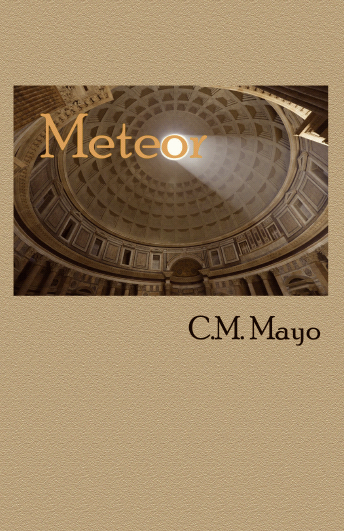
This blog posts on Mondays, usually. Second Mondays of the month I devote to my writing workshop students and anyone else interested in creative writing. Welcome!
> For the archive of workshop posts click here.
This makes me a popcorn-poppin’ party-pooper, but I’m going to give away the ending of Charlie Chaplin’s 1923 “The Pilgrim,” about an outlaw in stolen priest’s garb— not because this is what I’m saying you’ll find in Mexico, necessarily, but to point to enduring stereotypes that might mislead you.
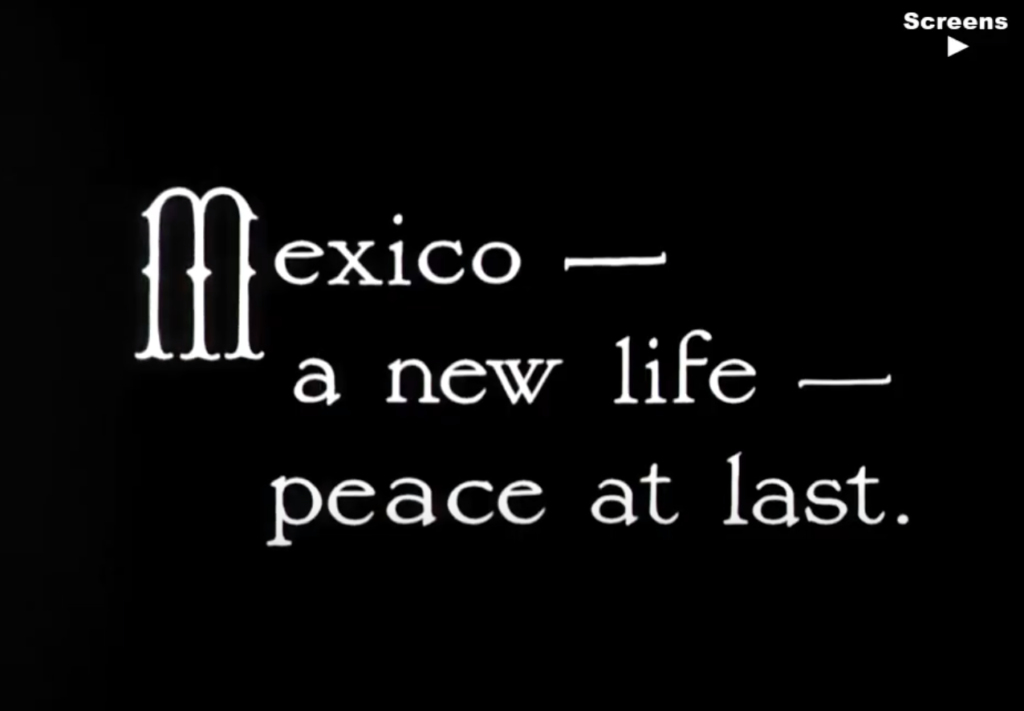

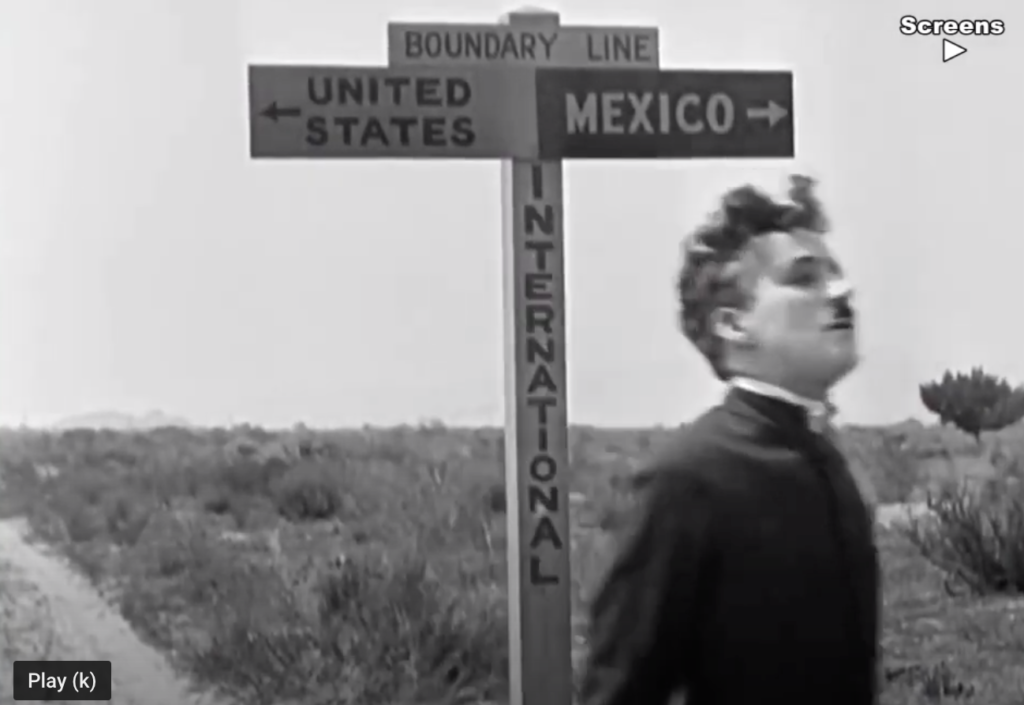
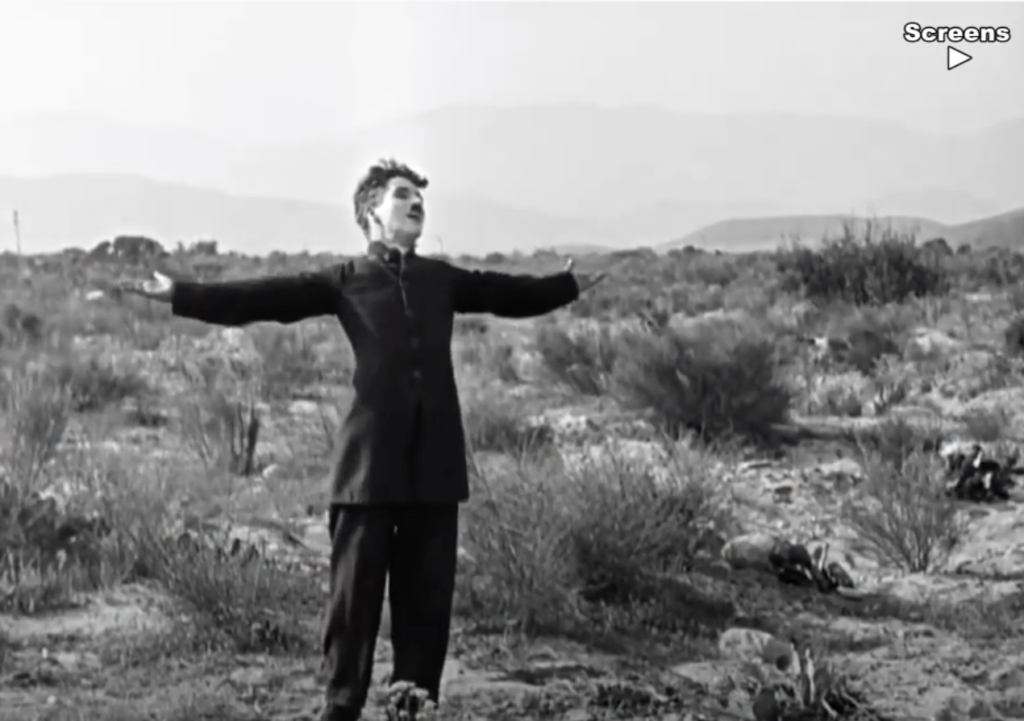
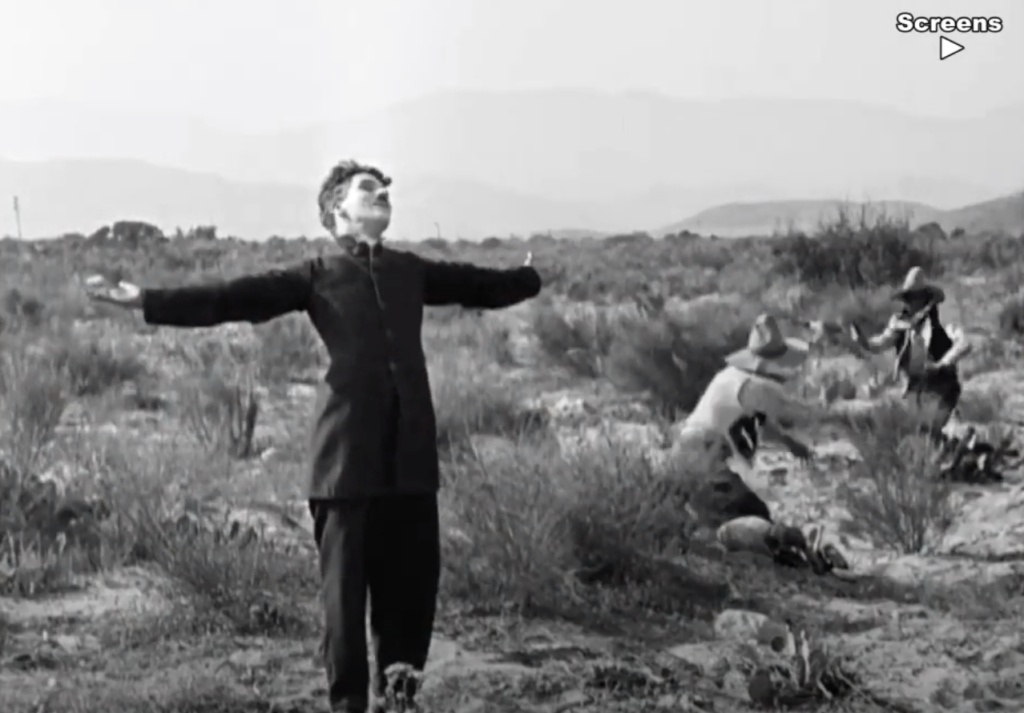
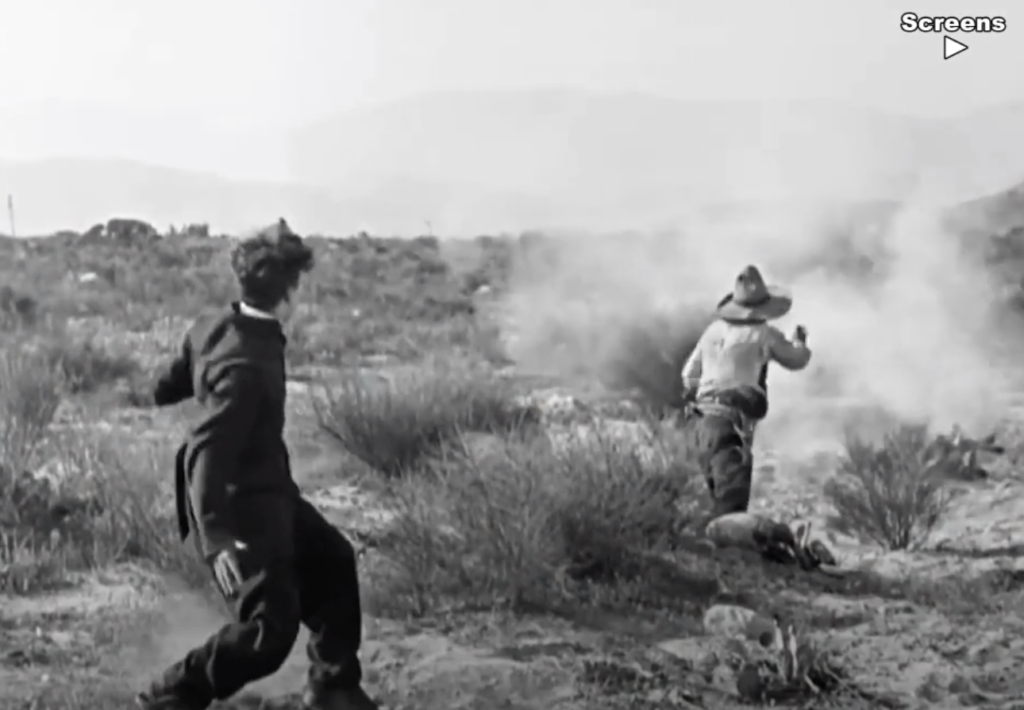
*
Speaking of law and order, I did notice, more than a few some nooks and crannies of this world are looking more than a little bit bio-medical police-state-y. Because I have written books on Mexico, a number of readers write, urgently asking, Should I move to Mexico?
In case you were wondering about my sympathies: I stand for respecting and defending the rights enshrined in the constitution of the United States, of which I am a citizen. Rights are not “privileges,” I didn’t buy that switcheroo. I could give you my screed on civil and human rights, enriched with quotes by Thomas Jefferson and Hannah Arendt, but I’m sure you didn’t come here for that, so I’ll vacuum-pack it down to the memes:


That said, in this literary blog I do not purvey
(a) individual personal advice;
(b) medical advice;
(c) commentary on contemporary national or international politics; nor
(d) natter on about the arcana of public health policy (many other people can do that much better than I can— to take but one example, Dr. Martin Kulldorff).
This is, after all, the second Monday of the month, when I post something for my writing workshop students. Normally on a winter month’s second Monday, such as this one, I might be reporting on the San Miguel Writers Conference in San Miguel de Allende, that enchanting bougainvillea-bedecked (if increasingly traffic-clogged) colonial town some three hours north of Mexico City. Because of concerns about the-virus-that-shall-not-be-named, however, that conference has been bumped out to February 2023.
Hint: Maybe Mexico—or at least the nook or cranny of Mexico that you, as a foreigner, might happen to land in— isn’t quite the free-for-all that some of you imagine.
And there are, as there always have been, many Mexicos— to borrow the title of Lesley Byrd Simpson’s landmark history.

But to begin to address your concerns: Putting on my hat as an armchair sociologist— (that would be the baseball cap I also use for dog-walking that says MEAT SCIENCE)— I would point to a strong presence at the San Miguel Writers Conference of both Mexican writers and US, Canadian, and other English-speaking writers living in Mexico, but also many writers winging in from tonier parts of the US East Coast and US Southwest. Some writers dig that scene (there are agents! and editors!). The last time I attended, I chaired a panel on Global Migration: People and Their Stories (with Elizabeth Hay, Lisa See, Luis Alberto Urrea, and Juan Villoro. Best-selling author Naomi Wolf, down from New York City, was a standing room-only keynote speaker (here we are in March 2022, but oh my, how things have changed, I’d be surprised to see her on the mainstream media again anytime soon.)
My inner armchair sociologist will suffice, before dropping the curtain on all of this— and hanging my TEXAS A & M MEAT SCIENCE baseball cap back on its hook— to note that the other day I received an invitation to a reading in Mexico by a writer, one closely associated with the above-mentioned writers conference, that was for “vaccinated only.” Those among the un- who might wish to hear that speaker (a speaker outspoken on the need for more freedom, I am not making this up) are to be segregated into that pathogen-free zone known as Zoomlandia. Just an anecdote, for your sociological edification.
As I write this, in March 2022, that I know of, the Mexican government has not imposed jab mandates, nor health passports. In the future, what will Mexican policymakers do, or not do, you ask, in regards to public health policy and public policy generally?
Sorry, but in the winter of 2020 my Aztec obsidian scrying mirror crack-a-doodled.
I’m not being flippant. Seriously, honestly, I have no idea what to expect when, after the winter of 2020, all over the world, including in Mexico, so many strange things have happened that I never could have imagined. And hey, I write fiction.
*

*
Writing in Mexico— that’s something I can confidently say more about. For now, March 2022, while I don’t know of any upcoming writers conferences other than the San Miguel Writers Conference scheduled for February 2023, if you can get to Mexico, and if you have a pencil and paper, no one can stop you! Write that novel! Scribble out that memoir! You might station yourself at a table under a palapa, by the sounds of the sea… (and if you could use any writing prompts, you’ll find 365 of them here).
No worries, you do not need documents attesting to your medical history for entry into Mexico, just a valid passport.
However, as of March 2022, attending the above-mentioned literary event— or, say, certain Mexican weddings, or other social gatherings among certain groups in certain places— might be a dicey proposition if you are not prepared ***and willing*** to present at the door documents confirming that you have been injected with the number and nature of medical treatments that satisfy your hosts’ definition of “vaccinated.”
FYI, your European “recovered-from-covid” genesen certificate doesn’t count with many of these folks. (Then again, Mexico is renowned for its culture of flexibility. You might try it and see.)
As I write this in March 2022—the situation, of course, is evolving— for many Mexicans, as for many foreigners resident in Mexico, “fully-vaccinated” means that you’ve had your two, plus your booster, for a total of three injections. My inner “armchair sociologist” notes that “vaccinated” (without the “fully”) seems to be employed a little more loosely.
In Mexico, a Sputnik jab will pass muster, but puts you perilously low in the pecking order.
Ditto anything Chinese.
AstraZeneca is a notch up, then J & J.
Prime are the mRNA vaccines (the word “vaccine” having been legally redefined to encompass what was previously known in the pharmaceutical industry as “gene therapy”), made available in 2020 under the US FDA’s Emergency Use Authorization, for which, early on, many Mexicans and many foreigners resident in Mexico traveled to the US to roll up their sleeves. I refer to Moderna and Pfizer.
Moderna or Pfizer? In some places in Mexico, it’s the conversation. Be prepared.
*
Dear writerly readers who have been so urgently writing to me, as you may already be aware, in its storied past, Mexico has given refuge to those fleeing slavery, pogroms in Russia, the Russian Revolution (most famously, Leon Trotsky) the tumult of the post-Weimar Republic (B. Traven), Spanish fascism under Franco, German fascism and the Holocaust under Hitler, Communist witch-hunts of the 1950s in Hollywood, Cuba of the 1960s, Argentina and Chile of the 1970s, & etc., so, yes, if you are fleeing something, it might stand to reason that Mexico might arise on your horizon as a possibility.
Moreover, true it is that many Mexicans, as well as many foreigners resident in Mexico, have wholly different ideas about the virus-that-shall-not-be-named than the ones retailed by the vaccinators. There are those who have a variety of religious and/or other objections to taking the jabs. Vaccinators might dismiss most of these people as, shall we say, rustic characters, but that could not be said of those who follow the likes of el gato malo, Eugyppius, Steve Kirsch, realnotrare.com reports (this one’s a doozy), and watch censored and shadow-banned videos, such as the latest in mind-furniture-rearranging from Oracle Films. (And if you were heretofore unaware, and happen to be curious, está Usted servido.)
As it could be said of opinions about and attitudes towards the topic-at-hand in many other countries, from stringent Australia to strictest Austria, in relatively laissez-faire Mexico there appears to be a profound divide between urban and rural populations, and between the higher and the lower social classes, with many exceptions sprinkled all about.
Ahoy, sociologists, and that includes you novelists!

*
As for whether you should or should not go live in Mexico, I would not presume to say. Like I said, I cannot see the future, and I don’t dispense individual personal advice.
What I can tell you, after some three decades of living in Mexico City, and traveling all around Baja California, and elsewhere throughout Mexico, and writing several books about Mexico, and also translating oodles of Mexican fiction and poetry, is that I love Mexico, and I find it endlessly fascinating. Moving there in 1986, which I did for personal reasons, was one of the best decisions of my life.
However, as you might guess, my years there (interspersed with some spells abroad) have not always been a stroll with an ice-cream cone on a sunny morning in the park.
As for questions along the lines of, what’s it like to live in Mexico, is Mexico safe, what do I think of (insert name of prominent politician), in all seriousness, humbly, and in all compassion, my wish for you being that you take the best decision for yourself as possible, I toss these questions back to you—
What is it like to live in your country?
Seriously: How would you answer that? What is your full knowledge base, which are your areas of ignorance, what aspects of life there most concern you, and whom are you addressing?
Is your country safe? How quickly, and how accurately, could you answer that?
What do you think of (insert name of prominent politician in your country whom you are very upset about)? And where, exactly, do you get your information about (insert name of prominent politician in your country whom you are very upset about)? And upon reflection— reflection lasting more than 11 seconds— how genuinely objective and reliable do you think that source information might actually be?
My point: a penthouse in Manhattan is not an off-the-grid farm in Idaho is not a modernist house in the historic district of San Antonio is not a 4th floor walk-up in Milwaukee with a view of the railroad tracks and a den-o’-nefarious-activities next door. What it’s like to live in the US? That depends on where you are in the US —among many other factors, including your history, your social network, financial resources, your own attitudes, and, I would venture to suggest, most crucially, the stories you tell yourself. Which can change.
I’m telling you, while I know some things about living in Mexico that might help you if you are considering moving there—and I gladly share them with you below— I am not the oracle for all questions about Mexico.
Mexico, too, is a large and extremely heterogeneous country— ethnically, culturally, geographically. It has some 130 million people and borders all sorts of oceans and three different countries, not counting Texas.
Speaking of Texas, I hear things are a little different there, than in, oh, say, California. And in Texas, as in California, if you’re on the ground here, you’ll observe important differences from one county to the next. Santa Clara County, California, Placer County, California: different planets.
Same story in Mexico. Coahuila isn’t Oaxaca isn’t Veracruz. Torreón isn’t Tijuana isn’t Monterrey isn’t Mexico City. And it so happens, I haven’t set foot in Oaxaca, Veracruz, Tijuana, Torreón or Monterrey in many years.

As for how safe living in one place or another place in Mexico might or might not be, sometimes you can have a gander at some data, if you make the effort to find it; mostly you’ll have to go by feeling “the vibes” and hearsay, and the closer to your target, the better, of course. This is true in the US, and this is especially true in Mexico.
The news, and the entertainments currently showing on TV or Netflix, could at times be, but generally, probably, are not your best orienting resource about Mexico. Please read this again: The news, and the entertainments currently showing on TV or Netflix, could at times be, but generally, probably, are not your best orienting resource about Mexico.
Now, I’m going to be annoying and say it a third time:
The news, and the entertainments currently showing on TV or Netflix, could at times be, but generally, probably, are not your best orienting resource about Mexico.
Ninety-nine percent of them will give you about as much information as the still from last scene in Charlie Chaplin’s 1923 “The Pilgrim.” It’s not much, and it’s almost a hundred years old. And you’ve already seen it.
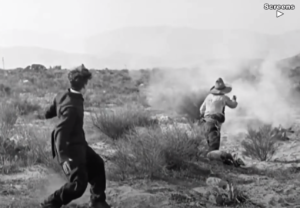
For the most part, books are a far better resource than popular visual media for learning about Mexico. Nonetheless, there too, clichés and time-wasters abound. I get to recommended books below.
But a lot of journalists have been getting killed in Mexico, you say. Yes, tragically. And there’s a lot of narcotrafficking. Yes, alas. But a question for you: In your own country, where the murder of a journalist might be only very rare an occurrence, might this rarity possibly be because certain persons’ acts of engagement in certain nefarious activities generating important cash flows are not deemed “news”? I cannot say I know the answer to this question in all its florid details. But, really, do you?
(Did the drugs arrive north of the border to be distributed by faeries waving wands? And, hmmm, might there be other nefarious activities generating important cash flows that are not deemed “news”?)
As for what I can say about safety in my own little barrio in Mexico City I would compare it to my experience living on the South Side of Chicago in the ’80s in that, you need to use your street sense, or get some, like, yesterday. Otherwise, usually, it’s a fine place to live. But Mexico City, a megalopolis of some 20 million people, has a lot of neighborhoods; some are more dangerous than mine, others safer. There’s a lot I simply don’t know.
As for (insert name of prominent politician you are very concerned about), different Mexicans have different opinions about him, ranging from his being Jesucristo reencarnado to something, um, better wear your garlic necklace! In short, the answer you get will depend on whom you put the question to, and that may well, might I shyly suggest, depend on what you might, maybe a little bit subconsciously, like to hear. Or what that person you have queried imagines you might want, or might be willing, to hear.
Who knows, they might just make sh*t up to yank your chain.
I cannot say I haven’t seen that happen.
Politics in Mexico, like politics in the US, or anywhere else, is pretty much a lucha libre. It’s a lot of show, and tougher than unshelled Brazil nuts to know what’s really going on. I can also tell you this: In years past, when I was in-the-know on a sliver of what was actually going on, and then read about it in the press, I just rolled my eyes and laughed, if I didn’t want to cry. Or just spit. I stopped reading or watching “news” a long time ago. I much prefer Willa Cather novels.
But! There’s More!
Six Questions for You
About Moving To Mexico
That Might Be Helpful For You
To Noodle On Some More
#1. Can you easily and lustily cackle like a coyote?
Because seriously, if you want to live in Mexico it really, really helps to have, and to deliberately cultivate, a wacky, high-vibe sense of humor. If you can take one thing from this long post, this is it.
As you might imagine, moving to Mexico is not easy for someone, such as myself, who grew up speaking a different language and in a different culture. Ask a Hungarian how it is to live in Berlin, or a Berliner to make a new home in Toulouse, or, say, an Uruguayan in Philadelphia; they will assuredly inform you that they have faced, and not always managed to tackle, a multitude of gnarly challenges.
To start with, people talk funny. The people there don’t think your way of understanding and of doing things is the only way, and in fact they oftentimes consider what you think is normal and/or wise and/or good to be plumb crazy and/or stupid and/or stinkingly bad. Their system for recycling is…err, something else. Etiquette— there’s a bramble patch.
Plan on offending a ton of people you never intended to offend (and also the inevitable little phalanx of unhappy souls who project their own nasty whatnot upon your innocent and clueless self, and who relish being So Offended by You! You Foreigner, You!)
To make your way living in another country can take more patience and flexibility and sheer head-banging lonely frustration than you can summon.
But maybe you can. Only you can know. And you won’t know for sure until you try.
A few people might think, “but I am Mexican-American, I speak Spanish, so it would be easy for me to go live in Mexico.” Well, there, too, I wouldn’t know what’s going to work, or not, for you.
But I do know that as a native English speaker of (partially) English descent, one who adored Beatrix Potter and C.S. Lewis and tea with cucumber sandwiches, I found living in England, as I did for a season many, many years ago, more of a challenge that I ever could have anticipated. Did I mention, they talk funny. They have a most peculiar social structure wherein one is expected to address certain persons as lord and lady & such-like. They use pounds sterling, their electric outlets take a concatenation of weird prongs, they set their thermostats at freeze-your-fingers-off, they drive on the wrong side of the road. Their “hamburgers” and “catsup” are absurdly horrible!! I was young, it did not last. Oh well.
Certainly there are many foreigners who have made their way in Mexico. Here is a picture of my American amigo who had the most rockstar Olympic champion high-vibe sense of humor: the poet and writer Bruce Berger (he passed away in 2021). Having learned Spanish while playing piano in Spain, he came back over the pond to spend his winters in La Paz, on Mexico’s Sea of Cortez (the balance of the year he lived in Aspen, Colorado). For a sampling of his humor, and his enchantingly poetic tales, you might enjoy Almost an Island: Travels in Baja California. The chapter about the nuns is my fave.

Another high-vibe American friend I very much admire, who has been living in Mexico City for many years, is historian and biographer Michael K. Schuessler. I invite you to listen in to my podcast interview with him about some wildly talented Mexican literary ladies.
#2. Do you have plenty of spare cash to pay your Mexican lawyer?
Because if you want to work in Mexico, legally, you will need to $$$hire$$$ a lawyer (and be very, very patient). Many an American, or other foreigner assumes that he can land in Mexico as a tourist and just stay indefinitely, oh, say, teaching English, or SCUBA diving. They learn differently when they get arrested by the Mexican authorities, and then deported.
Let me say that again:
Many an American, or other foreigner assumes that he can land in Mexico as a tourist and just stay indefinitely, oh, say, teaching English, or SCUBA diving. They learn differently when they get arrested by the Mexican authorities, and then deported.
And meanwhile, funny how that is, when employers realize you’re an undocumented worker, they don’t give you benefits, and they tend to pay, when they pay, very poorly.
In short, don’t be too quick to assume things about the ineptitude of the Mexican state, especially if your main source of information is popular entertainment and the mainstream media in your native country. (I hereby desist from saying again what I already said three times.)
#3. Are you OK with the fact that when you do achieve residency status, with the right to work, as a noncitizen, you will not have the right to vote or otherwise participate in the Mexican political process?
Once you have an opinion or seven, you might find this intensely frustrating! If you decide to go for Mexican citizenship, don’t ask me about it, talk to your Mexican lawyer. See again #1 and #2.
Now a brief intermission for more from the great Charlie Chaplin— in character as Adenoid Hynkel from his movie “The Great Dictator,” a classic of anti-fascism from 1940:






.
#4. Got Advil? For US citizens banking in Mexico can be a bit of a headache.
I know, banking in the US isn’t always a picnic, but for a US citizen it can take longer to open a bank account in Mexico than even the niños who believe Santa Claus lives in the Polo Norte would believe, and one fine day, as has happened to some Americans I know, including myself, you might find your balance wiped out— not stolen, exactly, just, oh, err, wiped out.
(You answered “yes” to the question about high-vibe sense of humor, I trust?)
How banking in Mexico is for other nationals, I have no idea.
#5. Can you define for yourself clearly what you mean by “living in Mexico”?
“Living in Mexico” and “living in Mexico cocooned in an expat community” might be entirely different galaxies of experience— and one expat community a different galaxy of experience from another.
I have never lived in an expat community, however, I’ve visited some of them, and I know a number of delightful Americans and Canadians who thrive in them.
Alas, however, it has not escaped my notice that, for not all, certainly, but for many expats, one of the prime attractions of an expat community is that it’s just like home but a heap cheaper and with better winter weather, you can squidge by without having to learn Spanish, and you’ll easily find friends who will sit around and whine and complain about Mexico with you while (a) watching CNN, MSNBC or (those are very deliberate italics there) Fox News (b) playing games (c) gossiping (d) commiserating about other peoples’ atrocious political opinions (e) drinking alcoholic beverages (e) ingesting other things it would probably be wiser to not ingest.
Ahoy, you novelists, rich pickings here!
FYI, Democrats Abroad is very active in Mexico, last I heard. But if you’re on the lookout for Republicans, they’re not hiding under rocks down there, either.
#6. Would you like to check out some books about Mexico?
As I said, books can be a far better resource for learning about Mexico than popular visual media. I can warmly recommend some superb literary art and illuminating histories…
The last time I received a flurry of readers’ questions about Mexico was in 2016 when Donald Trump… sigh. Was that a hundred years ago? Sure feels like it. I answered those readers’ questions by way of this reading list:
READING MEXICO:
Recommendations for a Book Club of Extra-Curious
& Adventurous English-Language Readers
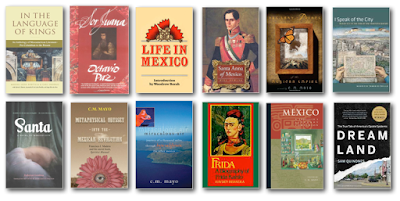
I need to update that list, most urgently with Alice L. Baumgartner’s magnificent work of original scholarship, South to Freedom: Runway Slaves to Mexico and the Road to the Civil War (Basic Books, 2020). (I touched on this topic myself in this long essay, “Great Power in One: Miss Charles Emily Wilson.”)
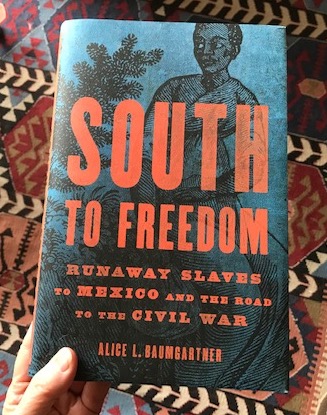
*

See also:
Q & A with Timothy Heyman on the Incomparable Legacy
of German-Mexican Novelist B. Traven
“Traven’s Triumph” by Timothy Heyman (Guest Blog)
Sam Quinones’ Dreamland: The True Tale of America’s Opiate Epidemic
“A Traveler in Mexico: A Rendezvous with Writer Rosemary Sullivan”
How Wide is Your Overton Window? Plus from the Archives:
“On Writing About Mexico: Secrets and Surprises”
I welcome your courteous comments which, should you feel so moved, you can email to me here.

Q & A with Lynne Sharon Schwartz About Crossing Borders
More on Seeing as an Artist or,
The Rich Mine of Stories About Those Who “See” the Emperor’s Clothes
From the Archives: My Review of Heribert von Feilitzsch’s
In Plain Sight: Felix A. Sommerfeld, Spymaster in Mexico, 1908-1914






